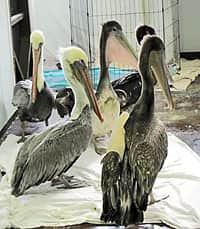Pelicans Face New Threat on Oregon Coast: Junk Food
OutdoorHub 11.21.11

Tillamook, Ore. – One of the most distinctive birds on the Oregon coast is the brown pelican, with its famous large throat pouch and gregarious personality.
Until 2009, these unusual aquatic birds were listed for protection under the federal Endangered Species List after their populations suffered from the ill effects of the pesticide DDT. Though brown pelicans have made a comeback since DDT was banned in 1972, they now face another challenge: junk food.
“Pelicans are used to feeding on live fish in estuaries and the ocean, not potato chips” said Herman Biederbeck, wildlife biologist for the Oregon Department of Fish and Wildlife’s North Coast District.
For reasons scientists don’t yet fully understand, brown pelicans that migrate from California to Oregon’s north coast in the summer are staying longer into the fall and into the winter, according to Biederbeck. As a result, they are often stressed by the weather and more prone to getting handouts from people, which is bad for the birds.
“People are increasingly feeding these pelicans, almost always to the birds’ detriment,” said Biederbeck. “We want to discourage people from feeding them.”
ODFW discourages feeding any wildlife and especially brown pelicans, which under normal circumstances sustain themselves by scooping up small fish in their large bills while swimming in the ocean However, since the birds are staying around the north coast into the fall and even the winter they’re e subject to battering by storms that hit the Oregon coast this time of year.
“Anytime we have big winds or big surf the pelicans start getting hurt,” said Sharnelle Fee, director of the Wildlife Center of the North Coast, a nonprofit wildlife rehabilitation facility in Astoria that cares for injured pelicans. “If they get caught in that big surf they can get pummeled and washed to shore.” When they do they have a tendency to beg for food from humans.
Biologists say there are several problems with feeding pelicans. First, the types of foods that people give them can make them sick. Fee has treated pelicans that have consumed chicken bones, hotdogs, donuts and potato chips, for example.
“When you have a hungry pelican they’re going to eat anything you put in front of them,” she said, adding, “These kinds of foods can actually kill them.”
The other problem with handouts is they encourage the birds to stay on the north coast when they should be migrating south to their winter breeding grounds in Baja California instead.
“If people hold them up here by feeding them, the cold will kill them,” Fee explained. Unlike ducks and geese, which stay in the water during cold spells, pelicans haul out at night and are subject to harm from colder nighttime temperatures and wind-chill factors. Pelicans’ feet are particularly vulnerable, according to Fee. If these birds lose more than half of the webbing on their feet to frostbite, Wildlife Center caregivers must euthanize them, she said.
“Pelicans are aquatic birds,” said Fee. “They need their webbing to swim and walk.”
Though brown pelicans have been delisted from the ESA, they are still protected under the federal Migratory Bird Treaty Act, and people who harass or harm them are subject to criminal penalties.
This year the U.S. Fish and Wildlife Service counted 17,495 brown pelicans on the Pacific coast from Smith River, Calif., to Tunnel Island, Wash., during its Sept. 15-16 aerial survey. The vast majority of those birds – 12,887 in all – were congregated on East Sand Island at the mouth of the Columbia River, according to Shawn Stephensen, a wildlife biologist for the USFW’s Oregon Coast National Wildlife Refuge Complex.
People who see an injured pelican on the Oregon coast are encouraged to call the Wildlife Center at 503-338-0331.

